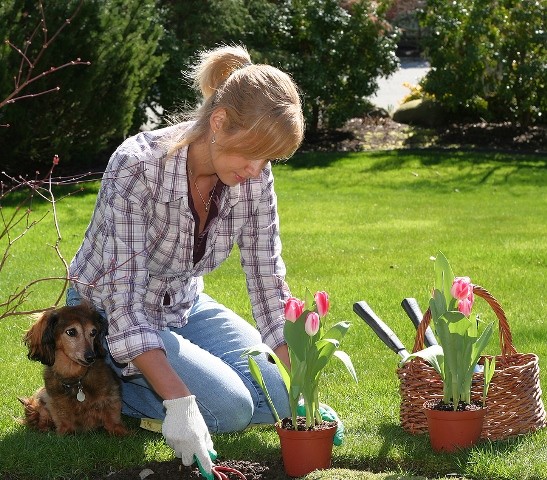Q: What should I be concerned about when I'm outside gardening with my pet?
A: Spending a beautiful day of gardening outside with your pet is sure way to bond. But it will be best to know your pet’s personality before you start to concentrate on your gardening chores.
Many dogs and cats have an affinity to eat things off the ground and even the most benign garden plant if ingested can still lead to vomiting, diarrhea, and gastrointestinal signs. Some plants may also have fertilizers and pesticides that will make your pet sick. Nowadays gardeners will use cocoa mulch which contains caffeine and theobromine. Although, some sources vouch that pets hardly ingest this mulch, it can be life threatening if they do.
There are many plants that are toxic to pets that will cause gastrointestinal illness such as vomiting and diarrhea to signs more serious like kidney failure, siezures, or even death. Some examples include Lillies (kidney failure), Rhododendrun(gastrointestinal signs, coma), Tulips (gastrointestinal, seizures), Oleander (abnormal heart function, death), and Chrysanthemum (gastrointestinal signs, depression, loss of coordination). For a full list, check out the ASPCA website. http://www.aspca.org/pet-care/animal-poison-control/17-poisonous-plants
It is also important to remember that if you have grape vines, onions, or garlic in your garden that your pets need to be kept away. Grape ingestion can lead to kidney failure. Onion and Garlic ingestion can lead to severe life threatening anemia in dogs and cats. Wild mushrooms can cause a pet to become severely ill (gastrointestinal, kidney failure, liver failure). Although there are some that may not be toxic, it is best to keep your pet away from these and have them removed from your yard.
The best thing to do is to spend time training your pet before allowing them to have free range of your yard. You will want them to know the commands “drop-it” or “leave it”. You will want your pet to “drop” whatever is in their mouth or “leave” whatever is about to go in their mouth.
If untrainable, it may be best to allow your pet outside only when you are watching them. Some pets need to always be kept leashed to prevent them from being mischievous. In rare and extreme circumstances, a basket muzzle may be needed for pets that have a tendency to swallow dirt, rocks, sticks, or debris off the ground. The basket muzzle, which prevents your pet’s mouth from touching the ground, will be a better option than having an ill pet or one that requires surgery.
Make sure that you have a secure fence without any holes in it. Some pets wander off and will leave your yard. They don’t always have to go through a hole in the fence either. I have seen some dogs that have dug under the fence as well as some that have jumped over the fence. So there are some escape artists out there. That’s why we always recommend microchipping your pet. Should they get lost and they don’t have a collar on, at least there will be a way that they can be identified if found and brought to a local veterinarian or shelter.
You will know your pet’s tendencies. Spending time in the garden together should be a fun time that doesn’t require a vet visit after. If you put the effort into training your pet and ensuring a safe environment, your time outside will be one that both you and your pet will look forward to regularly.






